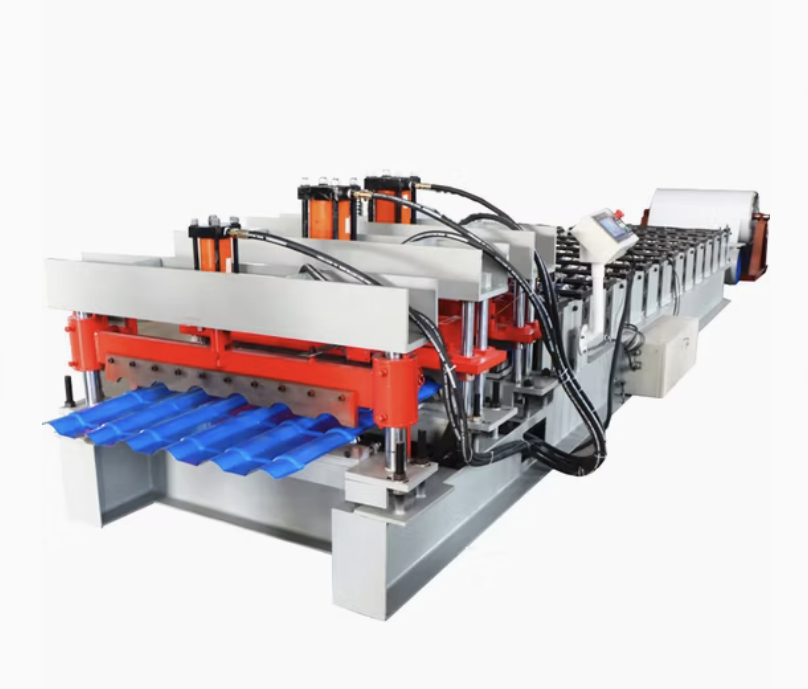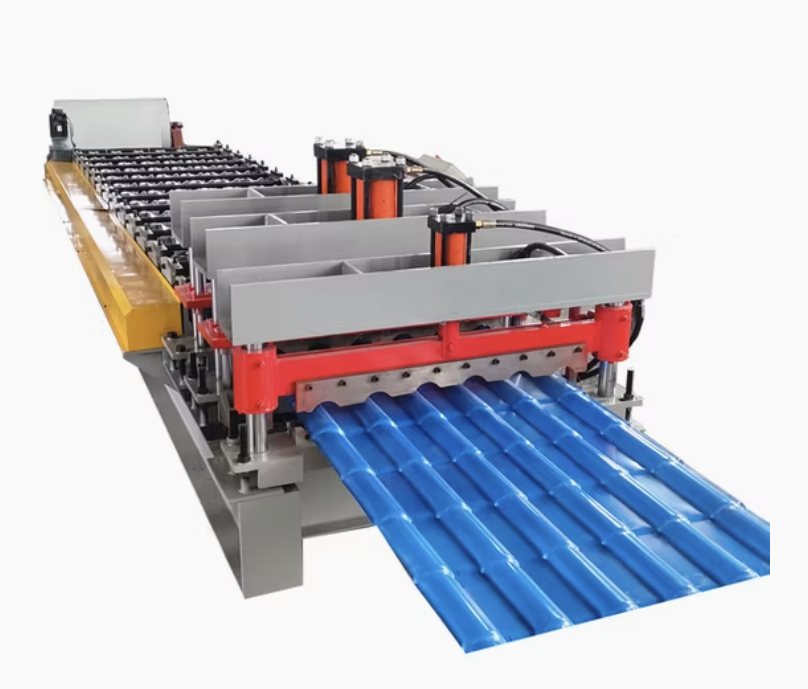To express an interest in this machine please submit the form below.

Not Sure What Machine You Need?
Select Your Profile, We'll Match It
Choose your desired profile drawing, and let Machine Matcher connect you with the best roll forming machine tailored to your needs.
Browse Profiles


Roof tile roll forming machines are specialized equipment used to produce metal roof tiles efficiently and accurately. These machines play a critical role in the construction industry, offering an alternative to traditional clay or concrete tiles. Metal roof tiles created by these machines are durable, lightweight, and aesthetically appealing, making them popular in both residential and commercial roofing applications.
A roof tile roll forming machine is designed to process raw metal coils, shaping them into roof tiles with specific profiles. The machine consists of a series of rollers, cutting systems, and a control system that allows precise adjustments. Operators can customize the machine settings to produce different tile designs, including classic and contemporary styles.
The roll forming process involves feeding a metal coil through multiple rollers that gradually bend and shape the material. After reaching the final profile, a hydraulic cutting system trims the tiles to the desired length. Modern machines often come with automated features, making the production process highly efficient with minimal manual intervention.
Here are the typical specifications of a roof tile roll forming machine:
Roof tile roll forming machines can produce various profiles, including classic clay tile imitations, wavy styles, and modern flat tile designs. The profiles are usually created from materials like galvanized steel, aluminum, or pre-painted steel.
Roof tile roll forming machines can be equipped with several optional features to improve functionality and ease of use:
Setting up a roof tile roll forming machine involves careful placement, alignment, and calibration. Here are the main steps:
Routine maintenance is essential to keep the machine running efficiently. Recommended maintenance includes:
Q1: What materials can a roof tile roll forming machine work with?
A1: Roof tile roll forming machines typically work with galvanized steel, pre-painted steel, and aluminum. The choice of material depends on the durability, aesthetic, and budget requirements of the project.
Q2: What tile profiles can I produce with this machine?
A2: You can produce various profiles, including classic wavy tiles, imitation clay tiles, and modern flat designs. Profile customization options vary by machine model.
Q3: How does the machine ensure precise cuts?
A3: The machine includes a hydraulic cutting system controlled by a PLC. This setup ensures each tile is cut to the exact programmed length, maintaining consistency across all tiles.
Q4: What are the power requirements for operating a roof tile roll forming machine?
A4: Most industrial roof tile roll forming machines operate on a 380V/50Hz power supply. However, some machines can be customized to meet other voltage standards as required.
Q5: Is it possible to operate the machine remotely?
A5: Yes, many modern machines come with a remote PLC system, allowing operators to control and monitor the machine from a distance, which enhances convenience and safety.
Q6: How fast is the production speed?
A6: Production speed typically ranges between 8–10 meters per minute, but this may vary depending on the profile complexity and material thickness.
Q7: What kind of maintenance does this machine require?
A7: Basic maintenance includes daily cleaning, regular lubrication of rollers, and periodic sharpening of cutting blades. Monthly checks for roller alignment are also recommended to ensure profile accuracy.
Q8: Can the machine handle heavy-gauge materials?
A8: Yes, most roof tile roll forming machines can process materials up to 0.8 mm in thickness. For thicker materials, custom adjustments may be necessary.
Q9: Is training required to operate this machine?
A9: Yes, it is recommended that operators undergo training to understand the machine’s PLC system, safety procedures, and maintenance requirements.
Q10: What optional extras can enhance machine performance?
A10: Options like stackers, remote PLC systems, coil car tippers, uncoilers, and leveling systems can improve productivity, reduce manual labor, and facilitate smoother production runs.
Roof tile roll forming machines provide an efficient solution for large-scale production of metal roof tiles, ensuring durability, customization, and cost-effectiveness in the construction industry. This guide covers the essentials to help you understand and operate these machines for optimal performance.
Copyright 2026 © Machine Matcher.